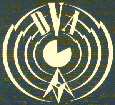

Clock DVA's first release. the cassette only, White Souls in Black Suits saw the light of day way back in 1980, when it was issued on Throbbing Gristle's Industrial label. The initial line-up consisted of Adi Newton (vocalist), Steven James Turner (bassist), Paul Widger (guitarist), Roger Quail (drummer), and Charlie Collins (saxophonist).
A year later the LP Thirst was unleashed through the Fetish Label and was soon being accepted as a 'classic.' Nevertheless, the same year saw the first Incarnation of Clock DVA come to an end. The mainstay of the band, Adi Newton, retained the name for future use and the three other members found a home in Peter Hope's band, The Box, Tragically, shortly after this this, Newton's best friend and co-founder, Steven James Turner, died from a heroin overdose.
1983. A new Live-up of Newton (vocalist), John Valentine Carruthers (guitarist), Paul Browse (saxophonist), Dean Dennis (bassist), and Nick Sanderson (drummer). Two 12' singles were released, preceding the LP Advantage on Polydor Records. The band's cult status was confirmed.
Clock DVA underwent a second personnel change in early 1984 leaving the trio of Newton, Browse, Dennis to further the sonic/visual experimentation that DVA and The Anti Group Conspiracy are interested in. TAGC being the second outlet for Newton's creativity: they released the 120 single HA/ZULU in 1985 and further projects followed between Advantage and the impressive 1989 DVA LP/CD Buried Dreams along with its associated singles The Act, The Hacker, & Sound Mirror.
Newton describes Buried Dreams: "It can be seen as an intermediate device between Cybernetics & Alchemistry. It toys in between Tradition and Technology and from this other comments I suspect there is a large complicated philosophy behind DVA's work that is not easily decipherable in their releases due to its complexity."
In early 1991 DVA's most recent work Transitional Voices was released, to the consternation of the Aid (see interview), who had seen Pout Browse depart to band replaced by Robert Baker (already a member of TAGC). This release documents DVA's live work in Solo". Unfortunately it contains only six tracks. Fortunately. unlike so many other live recordings, five of the six are completely new works. Germany's ZILLO Magazine said of this LP: 'With this, DVA stays years ahead of their contemporaries."
Clock DVA exude an aura of academy; taken seriously, the whole concept of DVA stretches far beyond the limitations of music, into sonics, light, vision, words, and literature. All these sources must be utilized in DVA's unique way in order for their product to achieve credibility beyond the world of music.
Further evidence of this can be seen in further quotations from Adi Newton: "The aesthetic application of technology is the only means of achieving a new consciousness to match our now environment. We can learn to understand the beauty of a machine that produces the kind of visions we see in a mediums. If the first computer was the abacus, the ultimate will be a slim aesthetic machine; a psychophysicist instrument for the erect projection of thoughts and emotions. The next phase of Clock DVA's development is based upon the realization and utilization of such programming with those machines. Technogeist is the term we arrived at to describe this synthesis.
DVA feet that the human body might be a natural audio-receptor, collecting day-to-day information in magical form; not sonic as some would interpret it, but the noise of life. Most things produce their own 'music.' Consequently the group accept the idea that each person's is psychological (even physiological) make-up could be influenced by this noise/music, so that each individual will be influenced differently.
As Robert Baker commented: "Who could know what day these kinds of topics and sections of this interview with Adi Newton, plus additional material will eventually be used in a series of articles and interviews exploring the relationship between 'Horror' Electronic/Industrial music." The questions constituting the following interview are based upon my personal interpretation of Clock DVA's works were intended to find out as much what the philosophy of DVA as possible, within the context mentioned above.
Technology Works: Regarding The Hacker: Nothing is new, everything that exists is derived from something else. Do you feel that this can be applied to the state of the electronic/industrial music scene today?
Adi Newton: What I was referring to within this quotation was a reference to the Newtonian concept that every particle of matter attracts every other particle. Everything is interconnected. These old ideas are again being referred to in the forefront of computer synthesis technology by constructionists, and newly concerted with parallelism, and in particular, the connection machine. I think we can only discover what already exists, so really nothing is new, we just delve higher levels of consciousness that can perceive and discover music so the power to it flows to the possibilities
Technology Works: Regarding Buried Dreams - The sleeve notes state that this track is based on the life of Countess Elizabeth Bathory, who could be seen as "De Sade's heroine." Explain your interest in her life (that of De Sade).
Adi Newton: I think the first thing that I felt akin to her was the overwhelming will of her desires to live out her existence beyond any restrictions, morally or physically. She killed over 1000 people, although she was in a prime position to do so, I don't believe this necessitated her ambitions, only strengthened it. In effect, Bathory, was De Sade's mistress. De Sade was truth I learned by her, and read extensively about his life, she lived out what De Sade theorized.